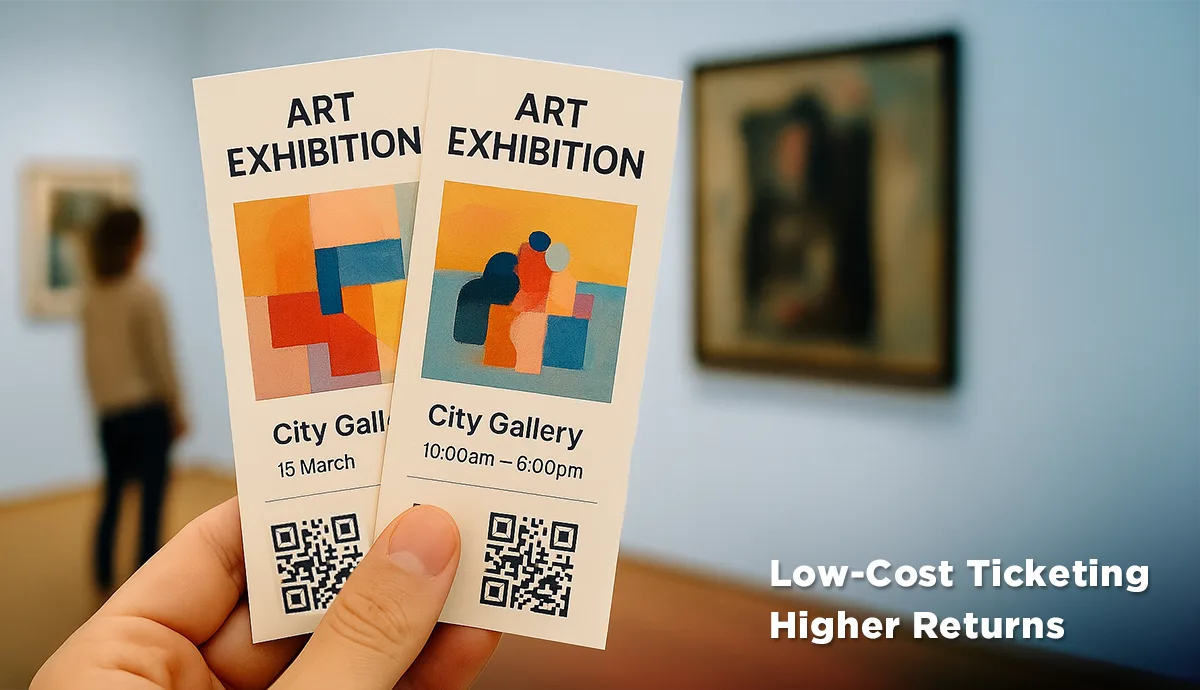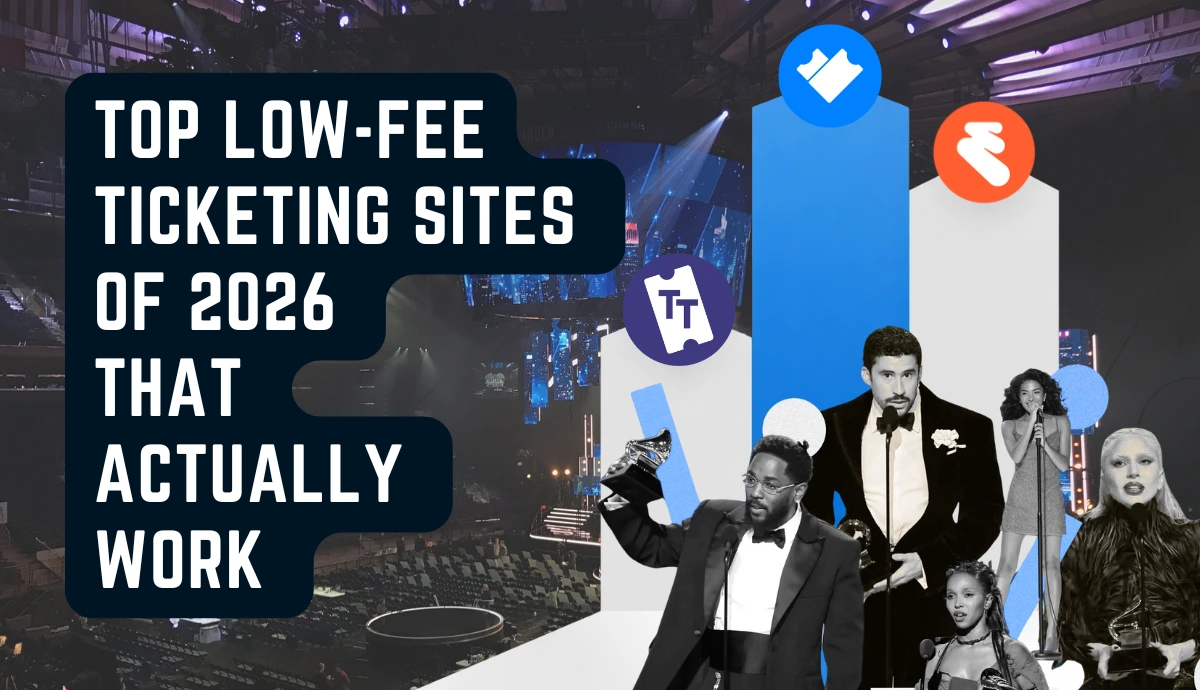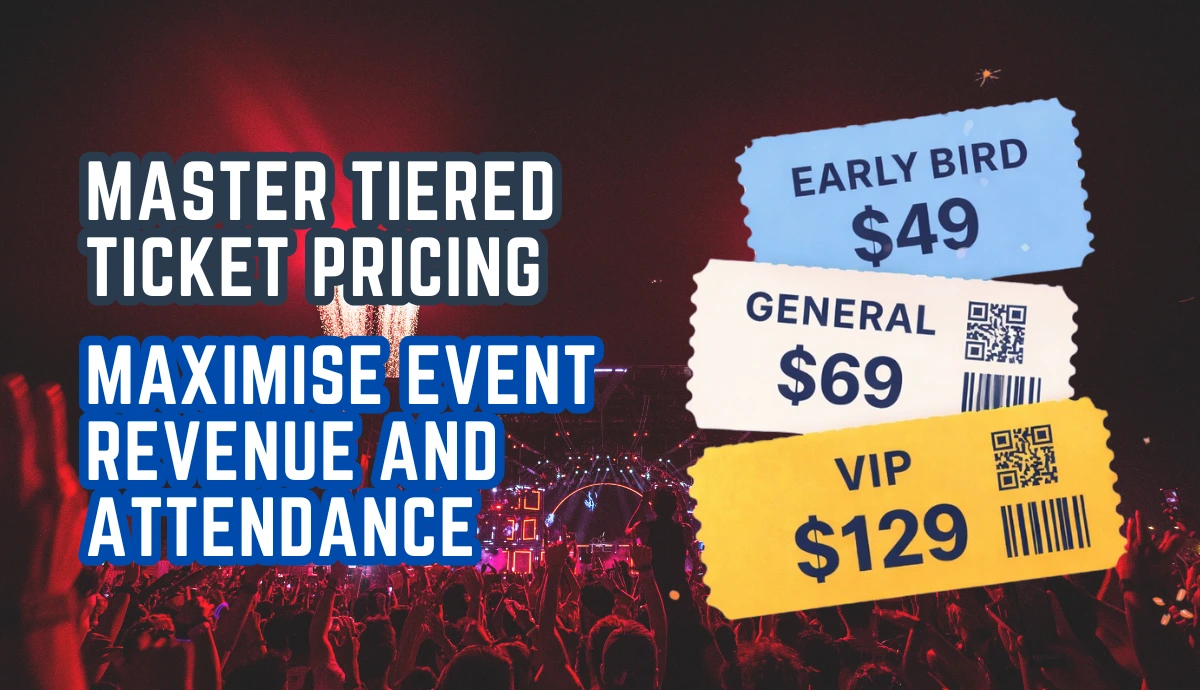Ticket fees are eating your profits. Service charges. Processing fees. Commissions. They all add up. Your hard-earned money goes to ticketing companies instead of your pocket.
Here's the truth: free ticket-selling platforms don't really exist. But low-fee platforms do. And they're much better than losing percentages on every sale. A free event ticketing platform means no commission—just small fixed fees. Like a free ticket maker saves on design costs, these platforms save on sales costs.
Workshop or concert? Charity event or conference? Doesn't matter. Using a free ticket sales platform the right way means more money stays with you. That money funds better events. Pays your team. Grows your business.
Ready to stop overpaying? Let's explore how to pick and use low-fee platforms for maximum profit.
A. What is a free ticket-selling platform?
A free ticket-selling platform skips the percentage game. No or very low percentage commissions eating your revenue. But let's be clear—"free" doesn't mean zero cost. It means avoiding high percentage fees on sales.
Traditional platforms take big cuts. Maybe 5%. Maybe 10%. Plus service charges. Free ticketing platforms work differently. They charge small fixed fees per ticket. Or flat monthly rates. You know the cost upfront. No surprises based on ticket price.
How do they stay in business? Simple math. Fixed fees from many users. Premium features for power users. Standard payment processing rates. Some show ads. Others offer paid upgrades. The basics stay affordable.
Good free event ticketing systems give you the essentials. Digital tickets work smoothly. Sales tracking happens in real-time. Check-in tools function properly. All without percentage fees. Need physical tickets? Check out free printable event tickets for DIY options.
B. What key features should you look for in low-fee ticketing platforms?

1. No or very low percentage commissions
This is the big one. Real free ticket selling platforms avoid percentage-based pricing. Watch for hidden commission structures. Some platforms say "free" but sneak in percentage fees. Read the fine print.
2. Transparent fixed fees
Know your costs upfront. Good platforms show exact fees per ticket. No math needed. No calculators. Just clear pricing. A solid free ticket maker works the same way—transparent costs, no surprises.
3. Real-time sales tracking
Data drives decisions. Watch sales as they happen. See which tickets move fast. Track your revenue instantly. Adjust pricing on the fly. Knowledge equals profit.
4. Mobile-friendly interface
Most tickets sell on phones. Test this yourself. Buy a ticket on your phone. Was it easy? Fast? Clear? If not, find another platform. Mobile matters more than desktop now.
5. Standard payment processing
Payment processing costs money everywhere. Usually 2.9% plus 30 cents. That's credit card company fees, not platform fees. Good platforms pass these through without markup. They also work as e-ticket generators for instant delivery.
Pick platforms with all these features. Don't compromise on the basics.
C. How do low-fee ticket-selling platforms compare?
Time for real talk. Every platform charges something. The question is how much and how. Let's compare actual options with real numbers.
Real cost example on a $50 ticket:
- Ticket Generator: $50.25 to $50.60
- Ticket Tailor: $50.28 to $50.75 (plus VAT where applicable)
- RSVPify: $51.88 (plus Stripe processing fees)
- Universe: $51.79 to $53.24 (Starter to Standard plans)
The differences multiply with volume. Ticket Generator works as a custom ticket maker with predictable costs. Need to generate tickets online quickly? All platforms handle basics, but fee structures vary significantly.
Choose based on your ticket prices and expected volume. Fixed fees favor higher-priced tickets. Percentage fees might work for very cheap tickets. Always calculate total costs before committing.
D. What strategies help maximize profits with low-fee ticketing?

1. Early bird pricing tactics
Start selling 3-4 months early. Offer discounts for early buyers. Create urgency with end dates. Early sales mean early cash. Use that money for marketing. Watch sales spike before deadlines end. Free ticket-selling platforms let you keep more of these early-bird revenues.
2. Bundle ticket offerings
Groups buy more. Offer 4-packs, 6-packs, 8-packs. Small discounts encourage bulk buying. Friends plan together. Families save money. You get bigger orders. Win-win for everyone using free event ticketing platforms.
3. Social media promotion tips
Money saved on fees becomes marketing budget. Run targeted ads. Share ticket links daily. Create contests. Partner with influencers. Every share might mean a sale. A reliable digital ticket maker creates share-worthy tickets on any free ticketing platform.
4. Email marketing integration
Your email list is gold. Send exclusive presales. Create countdown campaigns. Remind past attendees. Segment by interests. Email still drives ticket sales better than social media. Free ticket sales platforms often include email tools.
5. Referral program setup
Buyers become promoters. Give them discount codes to share. Track who sends sales. Reward top referrers. Word-of-mouth plus incentives equals more tickets sold through your free event ticketing system.
Stack these strategies. Save on fees. Sell more tickets. Maximize both sides of the profit equation.
E. What real-life scenarios show when low-fee ticketing makes sense?
Let's look at situations where free ticket-selling platforms save real money.
Small music venue scenario: Picture a 200-seat venue. Weekly shows. Tickets cost $30. Sell 150 each week. That's $4,500. Traditional platforms taking 8%? Gone. Fixed fees on free event ticketing platforms keep that money for the venue.
Nonprofit fundraiser scenario: Think charity gala. 300 tickets at $75 each. That's $22,500 for a good cause. Percentage fees hurt charities. A free ticketing platform with fixed fees means more money helps people.
Startup conference scenario: First-year tech event. 500 people paying $150. Total: $75,000. But margins are tight. Every percentage point matters. Free ticket sales platforms with fixed fees make budgets work.
Community event scenario: Neighborhood festival. 1,000 tickets at $10. Volunteers run everything. They need every dollar for activities. Party organizers know fixed fees beat percentages on concert ticket platforms.
See the pattern? Tight budgets need predictable costs. High volume needs low fees. Community events need maximum revenue. Fixed fees win every time.
F. What common mistakes should you avoid?

1. Not calculating total fees
Platform fee plus payment processing equals total cost. Many forget payment processing. Calculate everything. Compare real numbers, not marketing claims. Surprises kill profits when using any free ticket-selling platform.
2. Poor ticket descriptions
"General Admission" says nothing. Add details. "GA - Standing room, doors 7PM, show 8PM, 21+" sells tickets. Clear info reduces questions and refund requests on your free event ticketing platform.
3. Ignoring analytics data
Low-fee free ticketing platforms include analytics. Use them. Which traffic sources convert? When do people buy? Mobile or desktop? Data reveals opportunities. Ignoring it wastes money.
4. Limited payment options
Credit cards aren't enough. Add PayPal. Apple Pay. Google Pay. Buy now pay later for expensive tickets. More options capture more buyers on any free ticket sales platform. Don't lose sales to payment friction.
5. Misunderstanding "free" claims
"Free" rarely means free. Read the terms carefully. Look for platform fees, monthly fees, and limits. Test free event ticketing systems before committing. Verify all claims yourself.
Small mistakes compound. Pay attention. Test everything. Your profits depend on details.
G. People also ask
1. What does "free" mean for ticketing platforms?
"Free" usually means no percentage commission. You'll still pay small fixed fees per ticket and standard payment processing (2.9% + $0.30). Completely free platforms basically don't exist.
2. How do low-fee platforms compare to traditional ones?
Traditional platforms take 5-10% commission plus fees. Low-fee platforms charge fixed amounts per ticket, usually under $1, or very low percentage rates. On a $50 ticket, that could mean saving several dollars per sale.
3. What types of fees should I expect?
Expect three fee types: platform fee (fixed per ticket), payment processing (2.9% + $0.30), and optional features. Always calculate the total cost before choosing.
4. Can I switch from high-commission to low-fee platforms?
Yes. Export your customer data. Announce the change. Update your marketing links. Most switches take less than a week. Your fans follow you, not the platform.
5. Do low-fee platforms offer good support?
Support varies. Some offer email only. Others have chat or phone. Premium tiers usually get priority support. Check this before signing up.
6. What's the difference between fixed fees and commissions?
Fixed fees stay the same regardless of ticket price. Commissions take percentages. A $1 fee on a $10 ticket is 10%. On a $100 ticket, it's 1%. Fixed fees favor higher-priced tickets.
7. What's included in platform fees vs payment processing?
Platform fees cover the ticketing service. Payment processing covers credit card charges. These are always separate. Platform fees vary by provider. Processing stays around 2.9% + $0.30 everywhere.
H. Conclusion
Free ticket selling platforms—really low-fee platforms—change the game. Skip high percentage commissions. Pay predictable fixed fees or very low rates. Keep more revenue from every event.
Remember the truth: completely free doesn't exist. But low fixed fees beat high commissions every time. Pick transparent platforms. Calculate total costs. Use smart strategies.
Ready to keep more ticket revenue? Check out Ticket Generator and start saving today.
Smart organizers minimize fees at every turn. Master low-fee platforms now. Watch your profits grow with every event.









.gif)






